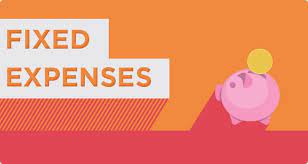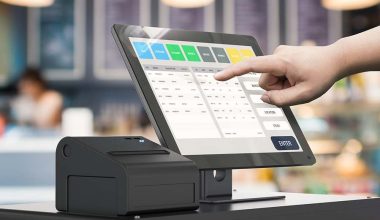Fixed expenses are viewed as an impediment to the entrance of new entrepreneurs. It is critical to understand the examples and how expenditures are allocated between variable vs fixed expenses in marketing. This gap is essential when projecting the earnings gained by changes in unit sales and, consequently, the financial impact of proposed marketing strategies.
In economics, fixed expenses usually referred to as indirect costs are commercial expenses that are not directly related to the number of goods or services produced by the business. They are frequently recurrent, such as interest or monthly rent payments. These are frequently capital costs as well.
What Are Fixed Expenses?
A fixed expense is one whose total sum doesn’t fluctuate as an activity such as sales or production increases. The term “fixed expenses” refers to those costs that remain consistent throughout your budget. You’ll always know precisely when and how much to spend, which makes these costs predictable. They are generally constant. While they can change on occasion, this should not occur frequently. For instance, if you change carriers or your landlord increases your rent, your fixed expenses will alter.
Fixed expenses are paid in fixed amounts consistently. The most popular payment schedule is monthly, but you can also pay weekly, quarterly, biannually, or annually. This is critical to remember when budgeting. If you pay your auto insurance bi-annually, for example, divide the payment amount by six to determine the monthly cost, but ensure that you have enough cash on hand to make the payment upfront.
In addition, when creating a budget, it’s critical to understand how to distinguish between fixed and variable spending. Understanding how to incorporate both into a budget is critical for avoiding overspending. Additionally, it can assist you in determining the percentage of your income to devote to debt repayment, savings, and other financial goals.
Definition of Variable Expenses
The term “variable expenses” refers to the polar opposite of “fixed expenses.” Variable expenses may reoccur every month. However, the amount you pay in any one month may fluctuate from past payments or future payments.
Variable expenses involve both necessary and discretionary spending. For instance, if you become ill, a doctor’s visit may be a necessary expense. A discretionary expense, on the other hand, is anything for which you budget money or spend money that you do not necessarily require. In other words, these are your budget’s “wants.”
Budgeting for variable expenses might be more difficult, as you may not be able to predict how much they will total from month to month. If you do not track variable expenses regularly, it is quite easy to underestimate or overestimate the percentage of your budget that should be allocated to them. This is something that a budgeting program can help you with since it can help limit the likelihood of variable expenses upsetting your spending plan.
How to Balance Fixed and Variable Expenses in Your Budget
Forgetting to budget for both fixed and variable expenses or under-budgeting for either can be an expensive budgeting error. If you have both sorts of monthly expenses, the following guidelines can assist you in properly budgeting for them:
#1. Focus on the basics.
Typically, your fixed expenses are also your most significant ones: a roof over your head, insurance, and child care. Therefore, while allocating your monthly money, it only makes sense to prioritize such bills over discretionary spending.
#2. Maintain an eye on variable expenses.
If you don’t track your variable spending, you may be setting yourself up for budgeting failure. Keeping track of your variable expenditure can help you identify how particular expense categories in your budget change over time, which makes determining how much money to allocate to them easier.
#3. Establish a baseline.
Having a foundation budget in place can be beneficial if you lose your job or work in the gig economy. This is the bare minimum monthly expenditure required to survive. Keeping that figure in mind might assist you in determining the portion of your budget that you can allocate to discretionary variable spending.
Next are the Examples of fixed expenses
Fixed Expenses Examples
Fixed expenses might include necessary monthly expenses, such as those required to maintain a certain level of life. Here are some examples of fixed expenses
1. While certain regular payments may not be vital for basic needs, they could be included as fixed expenses in your budget. If you pay a monthly fee for a gym membership or streaming subscription, for example, those expenditures may remain constant.
2. You can also classify savings as fixed expenses if they are regularly in the budget. For instance, you could set aside $100 per payday for an emergency fund. If you do so consistently and include it as a line item in your budget, you can legally consider it a fixed expense as long as you maintain your savings habit.
3. Other less typical fixed expenses include child support, alimony, back taxes paid via an installment plan, and payments made to fulfill a litigation judgment. These payments can be in production every month for the duration of the period for which you are to pay them.
4. Utility costs are in consideration to be constant expenses, their amount varies significantly from month to month. You will, however, always receive your bill at the same time each month and will always know when it is due. After receiving a few bills, you should be able to forecast the amount of each depending on your usage.
Consider the list below for more examples of fixed expenses
- Rent or mortgage payments
- Other loan payments
- Insurance premiums
- Property taxes
- Phone and utility bills
- Childcare costs
- Tuition fees
- Gym memberships
How Are Fixed Expenses Handled In Accounting?
The term “fixed costs” refers to a business’s core operating and overhead expenses. Fixed expenses are considered indirect costs of production, as they are not incurred directly by the manufacturing process, such as assembly parts, but they do contribute to total production costs. As a result, instead of being costly, they are low in value over time.
Fixed Expenses Factors
When businesses analyze unit costs, they can associate fixed (and variable) costs. As such, both types of costs can be inside the cost of goods sold (COGS). We calculate the gross profit by adding together all direct costs related to the manufacture of a good and subtracting them from revenue. Cost accounting is a process that varies according to the costs a business faces.
Scale economies can also be a factor for businesses capable of mass production. Fixed expenses can contribute to improved economies of scale by lowering per-unit costs as production scales up. Fixed costs associated with production vary by company but may include direct labor and rent.
Next is about variable vs fixed expenses.
Variable Expenses vs Fixed Expenses
Your budget will include both fixed and variable costs. However, what do these two terms imply? How do they compare to the distinction between needs and expenditure? Here is the answer to your question by reading through the fixed vs variable expenses
Fixed Expenses
Monthly fixed expenses are the same. The bills cannot be easily in adjustment and are usually in payment regularly, such as weekly, monthly, quarterly, or from year to year. Budgeting for set spending is far easier than budgeting for variable or discretionary expenses.
Mortgage or rent payments, auto payments, real estate taxes, and insurance premiums are all examples of typical household fixed expenses. While it is theoretically possible to reduce your monthly mortgage payment by refinancing your loan or appealing your property tax assessment, this is not a simple process.
Fixed costs include health insurance, auto insurance, life insurance, and homeowners or renters insurance. To alter these monthly payment amounts, you will need to spend several hours studying alternative options.
Reducing the Impact of Unpredictable Costs
The primary lesson here is that, contrary to their name, “fixed” expenses are not always constant. If you lose your work or wish to start saving aggressively, you may commit a few hours to eliminate fixed expenses. Because fixed expenses often account for the largest portion of your budget, the money you save in this category can be quite significant.
Saving money on fixed costs has another benefit: You won’t feel as if you’re sacrificing your lifestyle. Each year, shopping for a lower health insurance premium or a more affordable cell phone plan will take only a few hours of your time.
Once you’ve identified these cost-effective alternatives, you should include conservative spending into your monthly budget. In other words, cutting your fixed monthly payments will not help you feel more economical, because the majority of people do not consider their fixed monthly costs.
Variable Expenses
Variable expenses are those expenses that occur daily, such as dining out, purchasing clothing, sipping Starbucks, and playing a round of golf with your mates. Because these expenditures are discretionary, they are not in view to be variable. Rather than that, they are “variable,” as the amount spent varies from month to month.
The majority of variable cost is in link with expenditures, and some are in link with necessities.
For example, the majority of households spend varying amounts of money on groceries each month. Additionally, you’re likely to spend a different amount of money each month on gasoline and necessary car repairs and upkeep.
Reducing the Impact of Unpredictable Costs
Variable expenditures are typically the first expenses that consumers attempt to reduce when attempting to save money. Regrettably, variable costs are also some of the most difficult to reduce, as they necessitate a daily commitment to frugal decision-making.
Reduce a fixed cost, such as your cell phone plan, insurance, or cable package, by making a single decision and then living with it for several months or years.
On the other hand, reducing variable expenses means making many daily decisions about whether or not to purchase certain things or participate in specific events.
What Are the Fixed and Variable Expenses?
Variable expenditures are typically the first expenses that consumers attempt to reduce when attempting to save money, while Variable expenses involve both necessary and discretionary spending.
Are Groceries Variable Expense?
Yes, groceries are a variable expense. For example, the majority of households spend varying amounts of money on groceries each month.
Is a Water Bill a Fixed Expense?
Yes, it is a fixed expense. However, utility costs are considered fixed expenses, their amount varies significantly from month to month.
What Are 4 Common Variable Expenses?
Costs of goods sold (COGS), raw materials and inputs to manufacture, packaging, labor, commissions, and certain utilities are examples of variable costs (for example, electricity or gas that increases with production capacity).
Is Electricity a Fixed Expense?
Electricity is an indirect cost since it cannot be attributed to a specific product or machine. However, the cost of power is a variable cost because electricity consumption rises as the number of manufactured or produced goods increases.
What Type of Expense Is Groceries?
Variable expenses include groceries, car fuels, utilities, clothing, and entertainment. By keeping track of these expenses over time, you can have a better understanding of your monthly expenditures and make more informed financial decisions.
What Are Fixed Expenses Examples?
While certain regular payments may not be vital for basic needs, they could be included as fixed expenses in your budget. If you pay a monthly fee for a gym membership or streaming subscription, for example, those expenditures may remain constant.






